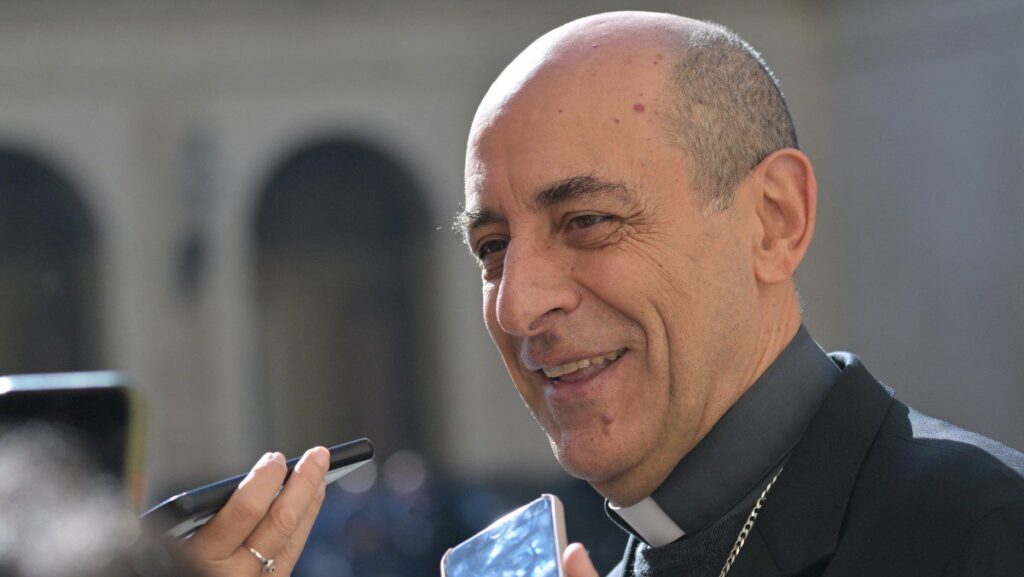
Photo: Andreas SOLARO / AFP
The Vatican has published a new declaration taking on issues such as abortion, euthanasia and gender theory. The long-awaited document, titled Dignitas Infinita [Infinite Dignity], does not offer anything fundamentally new on these issues, but the press conference at which it was presented drew considerable attention thanks to statements from Cardinal Victor Fernández, the Vatican’s doctrine chief.
The document’s section on “Grave Violations of Human Dignity” has gained the most attention. It deals with themes that are dear to Pope Francis—poverty, war, and forced migrant labour—alongside societal issues such as abortion and euthanasia, as well as surrogacy, gender theory, and ‘sex reassignment surgery.’ On all these subjects, the declaration reaffirms the Church’s traditional teaching in clear terms:
On account of the intangible value of human life, the Church’s magisterium has always spoken out against abortion. But today, in many people’s consciences, the perception of its gravity has become progressively obscured. The acceptance of abortion in the popular mind, in behavior, and even in law itself is a telling sign of an extremely dangerous crisis of the moral sense, which is becoming more and more incapable of distinguishing between good and evil, even when the fundamental right to life is at stake.
The document says that sex reassignment surgery is a serious attack on human dignity, in that it alters the unity intended by God between body and soul from the moment of conception. Euthanasia, which expresses the demand for a ‘right to die,’ is also severely condemned, as is surrogacy, which violates the dignity of both child and mother.
We could be pleased to see that the Church is constantly speaking out on these fundamental issues, which are the subject of increasingly serious transgressions throughout the world. However, the tone set by Vatican doctrine chief Cardinal Fernández at the press conference to present Dignitas Infinita is cause for concern, due to his ambiguous and evasive statements on crucial points of moral doctrine.
At the start of the press conference, Cardinal Fernández, who heads the Dicastery for the Doctrine of the Faith (DDF), the main body that oversees Church doctrine, returned to last year’s Fiducia Supplicans declaration, which authorised ‘informal’ blessings for homosexual couples. He once again tried to defend that document against opposition and railed against “iniquitous” laws condemning homosexuality, although did not define which laws he was talking about.
According to journalist Diane Montagna, who attended the conference, Cardinal Fernández was asked a question about whether or not he supported the Church’s traditional condemnation of homosexuality as “intrinsically disordered.” The prefect sought to soften the wording, stating that “it is a strong expression that needs to be explained & perhaps we could find an expression that explains more clearly what we mean.”
Critics also questioned exactly what the document means when it talks about humans having an “infinite” dignity.
The document is presented as:
a text highlighting the indispensable nature of the dignity of the human person in Christian anthropology and illustrating the significance and beneficial implications of the concept in the social, political, and economic realms.
It required several drafts before the final declaration was produced—a delay justified by “the gravity and centrality of the theme of dignity in Christian thought,” in the introductory words of Cardinal Fernández.
The declaration solemnly reaffirms the infinite ontological dignity of man, “created in the image and likeness of God and redeemed in Jesus Christ.” In addition to this ontological dignity, there are other dignities: moral dignity, social dignity and existential dignity. These other dignities may be temporarily lost, but the ontological dignity remains inviolable.
While the texts of the Second Vatican Council speak of an “eminent” human dignity, the newly published text, as its title explicitly indicates, goes further, describing this dignity as “infinite.” This appears to contradict St. Thomas Aquinas, in the Summa Theologiae, who recalled that sin could deprive a person of his human dignity (Summa Theologiae, Second Part of the Second Part, Question 64, Art.2, Reply to objection 3).
Leaving aside this reservation, there is still merit to the document. It reminds us that human dignity should not be subjected to the “arbitrary proliferation of new rights,” whereby “every individual preference or subjective desire” would like to be guaranteed to the extent that “dignity is identified with an isolated and individualistic freedom.”
While recalling the teaching of previous pontiffs on human dignity, the text includes elements of language specific to Pope Francis, who calls, on the basis of the “acceptance” of this dignity, for “a new coexistence between human beings, which declines sociality in a horizon of authentic fraternity.” As in his previous writings, the declaration devotes a great deal of space to self-citations by Pope Francis, who remains the overwhelming point of reference for the quotations throughout the text—47% of the sources cited in the notes.
It remains to be seen whether, in the developments that will be given to Dignitas Infinita, the defence of unconditional human dignity as conceived by Cardinal Fernández and Pope Francis will not turn into an ‘infinite’ welcome, i.e., unlimited—not of the sinner, but of sin.
